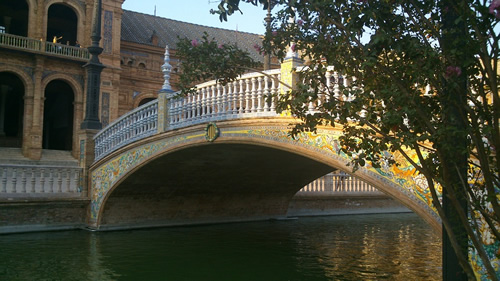Where to Learn Spanish in Seville
Get to Know Southern Spain's Rich Culture and Sociable People
By Volker Poelzl

|
|
A bridge in Seville (Sevilla as it is called in Spain).
|
Studying Spanish in Seville, one of Spain’s most charming cities, is a rich experience of Spanish music, art, and culture. Seville is not only a city with a thriving tradition of flamenco music and bullfighting, but it also has a well-preserved historic center with famous monuments such as the Alcazar palace. It is a city with a light-hearted atmosphere of picturesque courtyards, lush parks, and cobbled streets lined with orange trees.
But most of all, it is the friendly and outgoing Sevillanos who make Seville special. The locals enjoy a lively outdoor lifestyle of cafés and bars unrivalled in Spain. The famous Spanish appetizers, known as "tapas," originated here, and no stay in Seville is complete without a tour of tapas bars in the lively historic Santa Cruz district. It is especially easy to strike up a conversation with locals at a tapas bar, a café, or a flamenco club. In addition to enjoying Seville’s animated social life and conversing in Spanish with Sevillanos, language students have the opportunity to participate in dance and guitar classes and to learn the passionate and fast-paced flamenco rhythms that so well express the essence of Spain’s southernmost province Andalusia.
Selecting a Spanish Language School
Each private language school has its own teaching methods and practices, and you should ask detailed questions before making a final choice, so you can find the school and course that most closely meets your needs. For undergraduate students, some schools offer academic credit, but you should find out first if your school in the U.S. will accept such credits and what the requirements are. Compare course prices, housing, and excursion packages. Most schools offer accommodations for their students, usually either in shared apartments, residence halls, or homestays with Spanish families. Make sure that accommodation is reasonably close and within walking distance to your school. Inquire about class sizes, teacher qualifications and refund policy. Is the students’ average age appropriate for you? How flexible is the school about the course length? Is it easy to shorten or lengthen your stay? Keep in mind that prices per week often go down the longer you study.
Check the credentials of the language school you are interested in. The most common accreditation of language schools in Spain is from the Instituto Cervantes, a government institute that promotes Spanish language and culture, and the CEELE certificate, which is a quality certificate for teaching Spanish as a second language, issued by the Spanish department of the university of Alcalá de Henares. Other accreditations include FEDELE (Spanish Federation of Associations of Spanish Schools for Foreigners) and AEEA (Andalucian Association of Schools of Spanish).
CLIC (Centro de Lenguas e Intercambio Cultural) is a well-established school in the center of Seville that is part of the International House network of language schools. CLIC offers intensive, mini-group, private, and long-term Spanish classes for all levels, with 20 hours of instruction per week. Classes start every two weeks.
IELE (Instituto de Estudios de la Lengual Española), located in a historic house in the city center, offers a variety of courses for all skill levels.
Volker Poelzl is a contributorTransitionsAbroad.com. A travel writer fluent in five languages, he has found immersion in the local culture and contact with the locals the best inspiration for learning a foreign language.
|
